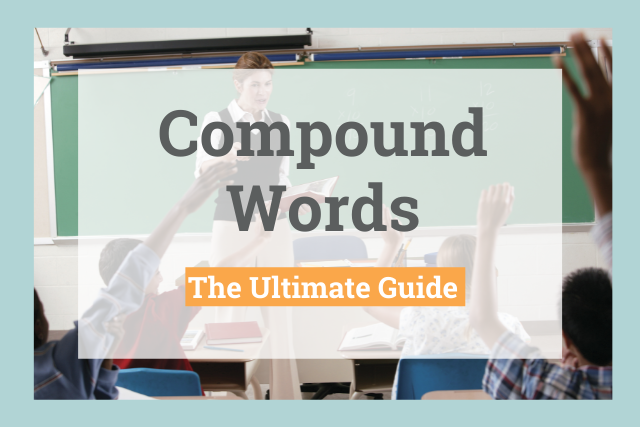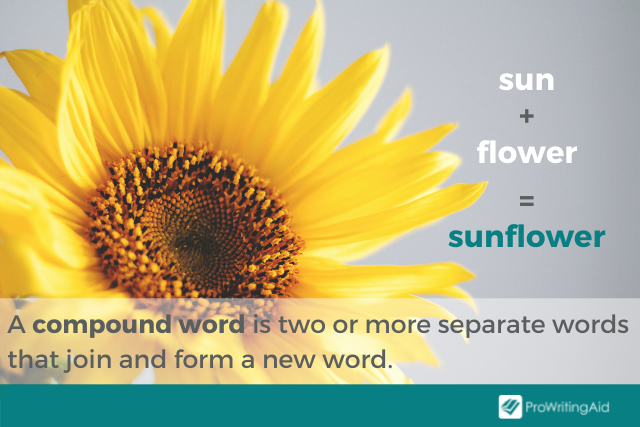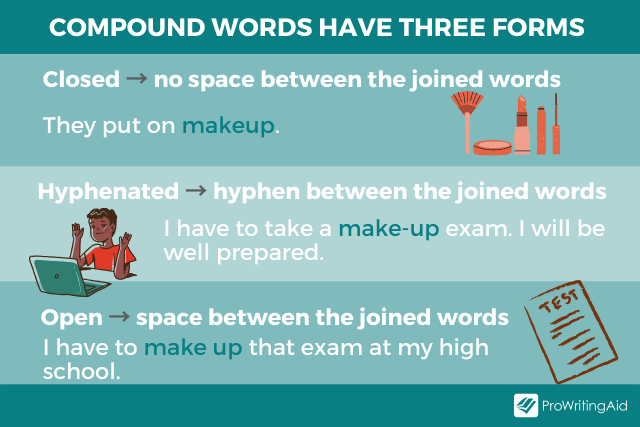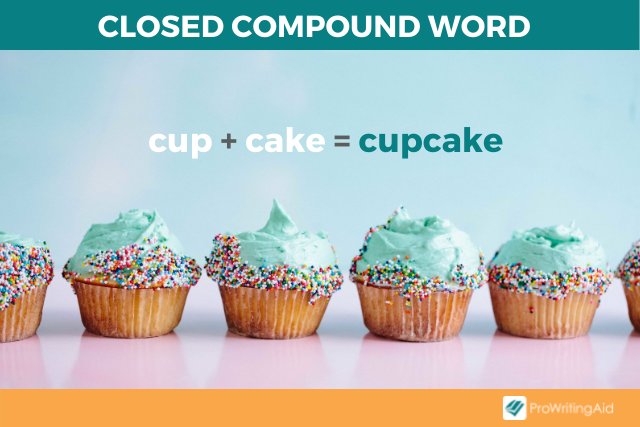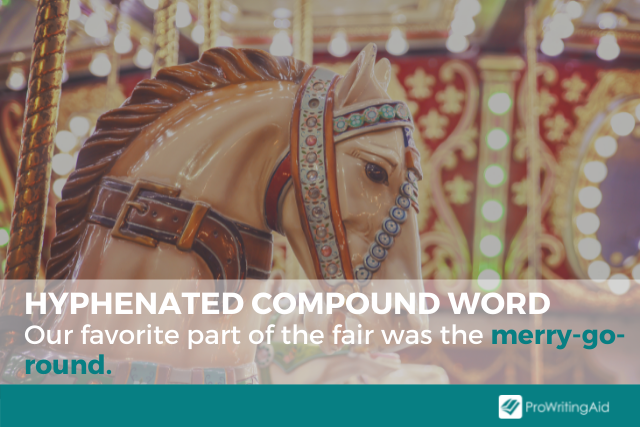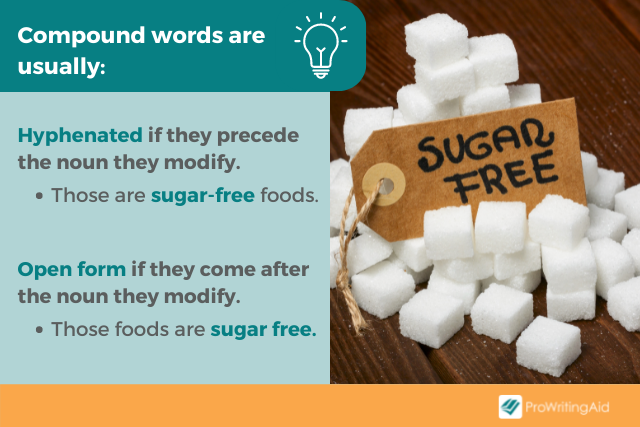The words pancake, living room, and merry-go-round have something in common.
They are all examples of compound words.
The noun compound means something made up of two or more separate components. Compound can also be an adjective meaning consisting of two or more parts or components.
A compound word is one word, or one unit of meaning, that is created by joining two or more separate words together.
What Are Compound Words?
A compound word is a word made up of usually two but sometimes more words that are joined together. The two (or more) that make the compound word are independent words; they have their own distinct meanings. When those words are joined and form a compound word, that compound word has its own new meaning.
The Three Types of Compound Words
Compound words can take three possible forms: closed, open, or hyphenated. In closed form, there is no space between the joined words. In open form, there is a space between the “joined” words that still act as one unit, and in hyphenated form—you guessed it! There is a hyphen between the joined words.
These general “rules”—which are somewhat fluid and flexible—provide guidance as to what format a compound word takes.
-
Closed compound words are usually nouns: They put on makeup.
-
Open compound words are usually nouns or verbs: I have to make up (verb) that exam at my high school. (noun)
-
Hyphenated compound words are usually adjectives or adverb-adjective combinations: I have to take a make-up (adjective) exam. I will be well-prepared. (adverb + adjective)
The key word in each of those examples is “usually.” Some compound words break the rules. We’ll see how soon.
1. Closed Compound Words
To review: closed compound words are usually made up of two separate words that are put together to form a new word. There is no space between the two words in a closed-form compound word; the compound appears as one single word.
Examples of Closed Compound Words
-
Cup + cake becomes cupcake
-
Basket + ball becomes basketball
-
Key + board becomes keyboard
-
Extra + ordinary becomes extraordinary
-
Birth + day becomes birthday
You can see through these examples that the meaning of the compound word is not just a merger of the independent definitions of the individual words that join together to make that compound.
However, there is a relationship between the individual word meanings and the compounds. Compound words have been integrated into language as speakers have discovered those relationships. It makes perfect sense to call a cake that could fit into a cup a cupcake and to call a ball thrown through a basket (now a hoop) a basketball.
The rules for compound words, listed earlier in the post, include the word usually. That word means the rules are not hard and fast, and there are examples of compound words that break those rules.
For example, compound words that are verbs are usually open form, but here are rule-breaking closed-form compound verbs that remind us to hold those rules loosely:
-
I need to proofread my essay.
-
I think the clerk shortchanged me.
-
I have to babysit my little sister.
2. Open Compound Words
In an open compound word, there is a space between the two independent words, though they are still treated as one unit with a new “compound meaning.”
Examples of Open Compound Words
-
Living room: as a unit, this compound noun refers to a room in a house.
-
High school: as a unit, this compound noun refers to a school that has students in grades 9-12.
-
Post office: as a unit, this compound refers to a building where mail is collected, sorted, and sent.
-
Give up: as a unit, this compound verb means to stop trying.
-
Ask for: as a unit, this compound verb means to request something.
3. Hyphenated Compound Words
Hyphenated compound words have hyphens between each of the independent words that serve as connectors. The hyphens are a visual cue that the words form one unit.
Some compound words are always hyphenated.
-
Merry-go-round
-
Mother-in-law (and brother-, sister-, and father-in-law)
-
Self-esteem
Did you notice that all of those examples are nouns? Remember: the rules are flexible!
Examples of Hyphenated Compound Adjectives:
When compound words are used as adjectives (officially known as compound adjectives), the hyphenation rules change depending on where the compound adjective comes in the sentences.
If the compound adjective comes before the noun it modifies (describes), you should usually add a hyphen:
-
High-speed chase
-
Part-time employee
-
Full-time job
-
Fire-resistant pajamas
-
Good-looking person
-
Well-respected politician
-
Up-to-date records
Of course, there are exceptions. Remember, those “rules” are flexible. Some compound adjectives that precede the nouns they modify never take a hyphen. For example, ice cream and high school:
- High school students
- Ice cream sundae
There’s really no “why” to explain these exceptions; we’ve just adopted these forms and made them part of our language.
Examples of Open-Form Compound Adjectives
If the compound adjective comes after the noun it modifies, the hyphen is usually omitted.
-
Make sure the files are up to date. “Up to date” modifies, but comes after, the noun “files.”
-
The cat is two years old. “Two years old” modifies, but comes after, the noun “cat.”
Though post-noun modifiers don’t technically take hyphens, according to Merriam-Webster, usage trends indicate the hyphens are often included anyway, if the compounds “continue to function as unit modifiers.” So there’s that flexibility again.
What About Adverb Compounds?
It’s easy to find examples of closed, open, and hyphenated adverbs.
As for the closed-form examples, we probably don’t even register them as compound words much of the time.
-
Sometimes
-
Thereafter
-
Somewhere
Open-form adverbs occur when the adverb is the first word in the compound and ends in —ly. You should not hyphenate after an —ly adverb.
-
We made the discovery early on.
-
Her opinion is highly regarded.
-
They entered the dimly lit room.
What to Do If You’re Not Sure Which Form Is Right
While those flexible rules can help you, there may still be times when you feel confused about which compound form to use. Don’t stress too much.
According to Merriam Webster, the rules are more like patterns. You may see differences in different publications depending on editorial choice and style. For example, I looked on Amazon for a teapot. I saw mostly teapots, but also a few tea pots. Out of curiosity I put “tea pot” into a New York Times search bar, and found articles from the 1800s that included “tea-pot” in the title!
While interesting, those stylistic changes and choices shouldn’t be too surprising. Language is fluid and ever-evolving. Compound words themselves are proof of that evolution.
Keep Clarity the Focus
The purpose of hyphens in compound words is to ensure clarity. For example,
-
I bought over-the-counter medication.
-
He passed the medicine over the counter.
In the first example, I know by the hyphen that the medicine «I» bought did not require a prescription. «Over-the-counter» is one unit—one compound—describing a type of medicine.
In the second example, «over the counter» is serving another purpose and, while the words form a phrase to tell me where «he» passed the medicine, hyphens do nothing to make the purpose of the phrase clear and are therefore unnecessary.
Now look at these examples:
- He owned a little-used car.
- He owned a little used car.
In the first example, I know the man owns a car that has not been driven much. The car is described by the compound modifier «little-used.»
In the second example, it seems that the man owns a used car that is also small, or little. In this example, putting a comma after «little» would help to separate the two words, «little» and «used,» and show that they aren’t intended to work as a compound.
ProWritingAid Can Help
Though you’re a compound-word expert now, if you find yourself with lingering doubts, remember that ProWritingAid is here to help. It will let you know if you’ve added an unnecessary hyphen after an -ly adverb, or if you’ve left one out of a pre-noun compound adjective. You don’t have to write alone!
Take your writing to the next level:
20 Editing Tips from Professional Writers
Whether you are writing a novel, essay, article, or email, good writing is an essential part of communicating your ideas.
This guide contains the 20 most important writing tips and techniques from a wide range of professional writers.
поделиться знаниями или
запомнить страничку
- Все категории
-
экономические
43,632 -
гуманитарные
33,652 -
юридические
17,917 -
школьный раздел
611,700 -
разное
16,898
Популярное на сайте:
Как быстро выучить стихотворение наизусть? Запоминание стихов является стандартным заданием во многих школах.
Как научится читать по диагонали? Скорость чтения зависит от скорости восприятия каждого отдельного слова в тексте.
Как быстро и эффективно исправить почерк? Люди часто предполагают, что каллиграфия и почерк являются синонимами, но это не так.
Как научится говорить грамотно и правильно? Общение на хорошем, уверенном и естественном русском языке является достижимой целью.
There are various classes of words in the English Language ranging from nouns to prepositions. All these have been discussed in the post, Parts of Speech. However, some words are regarded as compound words. This post gives 1000 Compound Words Examples out of the several thousands of examples of compound words in English.
There is no end to how many compound words there are in English; but with these 1000 Compound Words Examples in English, though not exhaustive, you can research further on other compound words not captured here or, probably, generate your own.
Before I list the 1000 Compounds Word Examples in English, it would be great to describe compound words. The question then comes: what is a compound word? Let us proffer an answer to this important question…
What is a Compound Word?
Compound words in English are usually formed when we join two or more words together. In other, words, a compound word is the combination of two or more free morphemes to form a new word.
Compounding: A Word Formation Process
This takes us to the concept of Compounding, which is one of the word formation processes in English. Compounding takes place when two or more free morphemes that can stand severally on their own are brought together to create a new word. It could happen that the meaning of a compound word could be related to or different from the meaning or connotation it its constituent parts when considered severally.
Types of Compound Words
There are three types of compound words and these include: closed compound words, hyphenated compound words and open compound words. See more…
Closed Compound Words
In the closed compound words, the words involved are combined together. Closed compound words, most likely, are usually monosyllabic units already established in the language for a long time. Examples include: flowerpot, keyboard, notebook, bookstore, basketball, etc.
Hyphenated Compound Words
For the hyphenated compound words, a hyphen is used to join the words involved; for example: mother-in-law, merry-go-round, off-the-cuff, etc. The use of a hyphen in this instance helps to prevent ambiguity.
Open Compound Words
In the open compound words, there is a space between the compound words that are written together such as school bus, living room, carbon dioxide, snow white, blood red, etc.
What Determines Types of Compound Words
What determines if a compound word is classified as closed, hyphenated or open could depends on whether we use it as a noun, adjective or verb.
Verbs are usually open. For example:
- You must always back up the files on your computer.
- It is not good for students to carry over their courses
- Police usually follow up on a new lead.
Adjectives and nouns are usually closed or hyphenated. For instance:
- You can access backup copies of your files in case of any eventuality.
- The students had many carryovers in their courses.
- The police had already worked on the follow-up lead.
Adjective–adjective compounds, as well as, verb–verb compounds, such as blue-green and freeze-dried, are often hyphenated. Compounds that contain articles, prepositions or conjunctions, such as rent-a-cop, mother-of-pearl and salt-and-pepper, salt-and-sugar, hard-and-fast, etc. are also often hyphenated.
Longer words usually fall under the category of open compound words such as distance learning, player piano, lawn tennis, etc.
It is important to note that usage or forms of compound words in American English and British English Usage varies and is usually contingent on the individual choice of the writer rather than on a hard-and-fast rule; therefore, it is possible to encounter closed, hyphenated, and open forms for the same compound noun, such as the trio of:
- Container ship, container-ship or containership
- Particle board, particle-board or Particleboard.
Classifications of Compound Words
The constituent words in a compound word can be classified based on their Word Classes or Parts of Speech. We can call this type of classification a Syntactic Classification. The constituent words may be from similar Part of Speech or may be of different parts of speech. Let us see some examples:
Noun-Noun
This is an instance where both constituent words in the compound words are nouns. Examples include: airport, wallpaper, textbook, doorknob, waterbed, wastebasket, football, cufflinks, housewife, lawsuit, wallpaper, basketball, sodium chloride, classroom, workstation, tapeworm, crankshaft, etc.
Noun-Verb
The noun-verb compound word has a noun as the first constituent and a verb as the second constituent. For example: browbeat, sidestep, manhandle, safeguard, water borne, value-added, rocket-propelled, sunbathe, airlift, etc.
Noun-Adjective
The noun-adjective combination has a noun as the first constituent and an adjective as the second constituent. Examples include: snow white, world population, overcoat, trustworthy, blood red, handpicked, world famous, heartbroken, heart problem, prize worthy, lead strong, worldwide, lifelong, tax-free, sky blue, self-important, spoon-fed, praiseworthy, water-repellant, air-tight, bulletproof, etc.
Adjective-Noun
This is an instance where the first constituent word in the compound word is an adjective and the other one a noun. Examples include: blackboard, smartphone, whiteboard, badmouth, blue sky, red light, four wheel, full-time, long-term, etc.
Adjective-Verb
This instance is when the first constituent is an adjective while the second word in the compound word is a verb. Examples of this instance include: whitewash, blacklist, highlight, proofread, shortlist, etc.
Verb-Verb
In this instance, both constituents of the compound words are verbs. Examples include: typewrite, test-drive, freeze-dry, etc.
Verb-Noun
This is an instance where the first constituent word in the compound word is a verb and the other one a noun. Examples include: dreadnought, typewriter, breakfast, cutthroat, pickpocket, killjoy, spoilsport, know-nothing, breakwater, carrycot, etc.
Verb-Preposition
In this instance, we have a combination of a verb and a preposition forming the compound word respectively. Examples of this instance include: Roll off, roll on, stick on, walk on, stand by, walk through, see through, lay by, cut through, lookout, Work on, take down, take away, tear up, etc. Some of these examples also pass for Phrasal Verbs. You can take a look at the over 500 Phrasal Verbs discussed here.
Preposition-Noun
In this combination of compound words, we have a preposition coming first and followed by a noun. Examples of this combination include: overview, downsize, upgrade, underworld, oversight, undergraduate under-development, etc.
Preposition Noun (Phrase) Combinations
Examples of Preposition-Noun Phrase include: Off-the-record, over-the-counter, off-the-cuff, round-the-block, off-the-deep-end, off the hook, off the wall, off-your-head, off-your-own-bat, off-your-rocker, round-the-twist, round-the-corner, etc.
Preposition-Verb
This combination comprises a preposition and a verbs in the first and second constituents respectively. Examples include: overhang, counterattack, undercut, overpay, counterbalance, overrate, underlie, outrun, outvote, overreact, oversleep, overwork, undersell, undervalue, etc.
Other Combinations
There are other possible combinations like:
- Adjective-adjective (blue-green)
- Adverb-preposition (forthwith)
- Verb-adverb (tumbledown)
- Preposition-adjective (overripe, off-white)
- Verb-adverb (takeout)
- Preposition-adverb (without)
- Compound Adverbs (moreover, however, nonetheless, furthermore, meanwhile)
- Determiner-Noun Combinations or wh-forms (anyhow, somewhere, nowhere, sometimes, anytime)
You can attempt to fit the 1000 examples of compound words provided below into their appropriate combinations. I’m sure that should not be difficult for you to do.
It is also important to note that compound words in English, save for exceptions, are usually stressed on their first words.
1000 Compound Words Examples
It is really impossible to give an exhaustive list of all the compound words in English; especially, those that fall under the open class segment as there is no end to compound words that could be therein generated. But the list below contains 1000 Compound Words Examples in English. For emphasis, there are thousands of other examples. So, the list is not limited to what is provided below. Take a look…
1000 Compound Words Examples (A-D)
- Above-board
- Afterglow
- Afterimage
- Afterlife
- Afternoon
- Airbag
- Airbase
- Airborne
- Aircraft
- Airfield
- Airlift
- Airline
- Airmen
- Airplane
- Airport
- Airtight
- Airtime
- All-over
- Allspice
- Alongside
- Anybody
- Anyhow
- Anymore
- Anyone
- Anyplace
- Anytime
- Anyway
- Arm-twist
- Ashtray
- Baby bed
- Baby boom
- Baby boomers
- Baby carriage
- Baby-faced
- Babyhood
- Babyminder
- Babysit
- Babysitter
- Backache
- Backbeat
- Backbench
- Backbenchers
- Backbend
- Backbite
- Backblast
- Backbone
- Backbreaker
- Backdrop
- Backfire
- Background
- Backhand
- Backlash
- Backlog
- Backpack
- Backside
- Backslap
- Backslide
- Backspace
- Backspin
- Backstage
- Backstroke
- Backtrack
- Backward
- Ballpark
- Ballroom
- Bandwagon
- Bankbook
- Bankroll
- Baseball
- Basketball
- Beachcomb
- Bedclothes
- Bed lamp
- Bedrock
- Bedroll
- Bedroom
- bedspread
- Bellbottom
- Bellboy
- Bellhop
- Below
- Berrylike
- Billboard
- Billhook
- Bitterroot
- Bittersweet
- Bitterweed
- Bitterwood
- Blackball
- Blackberries
- Blackbird
- Blackboard
- Blackjack
- Blacklist
- Blackmail
- Blackout
- Blackpool
- Blacksmith
- Blacktop
- Blowgun
- Bluebell
- Blueberry
- Bluebird
- Bluefish
- Bluegrass
- Blueprint
- Boardwalk
- Body bag
- Body-boarding
- Body blow
- Bodybuilder
- Body hair
- Bodywork
- Bodyguard
- Bodywork
- Boldface
- Bookcase
- Bookend
- Bookkeeper
- Bookmark
- Bookmobile
- Bookseller
- Bookshelf
- Bookstore
- Bookworm
- Bootstrap
- Bowlegs
- Bowtie
- Brainchild
- Brainwash
- Brotherhood
- Brow beat
- Bugspray
- Butterball
- Buttercup
- Butterfingers
- Butterflies
- Buttermilk
- Butternut
- Butterscotch
- Bypass
- Cabdriver
- Candlelight
- Candlestick
- Candyfloss
- Candytuft
- Cardboard
- Cardsharp
- Cardstock
- Carefree
- Caretaker
- Careworn
- Carfare
- Cargo
- Carhop
- Carload
- Carpetbagger
- Carpool
- Carport
- Carrack
- Carryall
- Carsick
- Cartwheel
- Catchword
- Cattail
- Catwalk
- Caveman
- Centercut
- Cheeseburger
- Cheesecake
- Classmates
- Classroom
- Clockwise
- cocksure
- Coffeemaker
- Comeback
- Comedown
- Commonplace
- Commonwealth
- Cornmeal
- Counterattack
- Counterproductive
- Courthouse
- Courtyard
- Crewcut
- Crossbow
- Crossbreed
- Crosscut
- Crossover
- Crosswalk
- Dairymaid
- Daisywheel
- Daybed
- Daybook
- Daybreak
- Daydream
- Daylight
- Daytime
- Deadbeat
- Dead body
- Deadbolt
- Dead drop
- Dead-end
- Deadeye
- Deadfall
- Dead heat
- Dead letter
- Deadlight
- Deadline
- Dead load
- Deadlock
- Deadlocked
- Dead mail
- Dead march
- Dead metaphor
- Dickhead
- Dick test
- Dishcloth
- Dishpan
- Dishwasher
- Dishwater
- Diskdrive
- Dog-tired
- Dogwood
- Doorstop
- Double agent
- Double-barrelled
- Double-bedded
- Double bond
- Doublecross
1000 Compound Words Examples (D-N)
- Double-date
- Double-decker
- Downbeat
- Downcast
- Downcourt
- Downtime
- Downtown
- Downtrodden
- Downunder
- Drawbridge
- Driveway
- Duckbill
- Duckpin
- Duckweed
- Earache
- Eardrop
- Eardrum
- Earring
- Earthbound
- Earthquake
- Earthward
- Earthworm
- Egghead
- Eggshell
- Elsewhere
- Everything
- Extraordinary
- Eyeballs
- Eyebath
- Eyebeam
- Eye-catching
- Eyeglasses
- Eyelash
- Eyelid
- Eyesight
- Eyewitness
- Fatherhood
- Fatherland
- Firearm
- Fireball
- Fireboat
- Firebomb
- Firebreak
- Firecracker
- Firefighter
- Fireflies
- Firehouse
- Fireproof
- Firewater
- Fishbowl
- Fisherman
- Fisheye
- Fishhook
- Fishlike
- Fishmonger
- Fishnet
- Fishpond
- Fishtail
- Football
- Foothill
- Footlights
- Footlocker
- Footnote
- Footprint
- Footprints
- Footrest
- Footwear
- Forbearer
- Forbid
- Forebode
- Forearm
- Forebear
- Forebrain
- Forecast
- Forecastle
- Foreclose
- Foreclosure
- Foredoom
- Forefather
- Forefeet
- Forefinger
- Forefoot
- Forego
- Foregone
- Foreground
- Forehand
- Forehead
- Foreknowledge
- Foreleg
- Foreman
- Foremost
- Forepaws
- Foresee
- Foreshadow
- Foresight
- Forestall
- Forethought
- Foretell
- Foretold
- Forever
- Forewarn
- Foreword
- Forget
- Forgive
- Forklift
- Format
- Fortnight
- Friendship
- Fruitcup
- Gearshift
- Glassmaking
- Goodbye
- Goodnight
- Grandaunt
- Grandchild
- Grandchildren
- Granddaughter
- Grandfather
- Grandmaster
- Grandmother
- Grandnephew
- Grandnieces
- Grandparent
- Grandson
- Grandstand
- Granduncle
- Grasshopper
- Grassland
- Graveyard
- Gumball
- Haircut
- Hamburger
- Hammerhead
- Handbook
- Handcuff
- Handgun
- Handmade
- Handout
- Headache
- Headdress
- Headlight
- Headline
- Headquarters
- Heaven-sent
- Heavenward
- Helpdesk
- Helpline
- Helpmate
- Hereafter
- Hereby
- Herein
- Hereupon
- Herself
- Highball
- Highchair
- Highland
- Highway
- Himself
- Homemade
- Hometown
- Honeybee
- Honeybees
- Honeycomb
- Honeycreeper
- Honeydew
- Honeymoon
- Honeypot
- Honeysuckle
- Hookup
- Hookworm
- Horseback
- Horsefly
- Horsehair
- Horseman
- Horseplay
- Horsepower
- Horseradish
- hotbed
- hothead
- Houseboat
- Household
- Housekeeper
- Housetop
- Housework
- However
- Intake
- Interstate
- Ironwork
- Itself
- Jackpot
- Jailbait
- Jellybean
- Jellyfish
- Jetliner
- Jetport
- Jumpshot
- Jumpstart
- Keyboard
- Keyhole
- Keynote
- Keypad
- Keypunch
- Keystone
- Keystroke
- Keyway
- Keyword
- Lacklustre
- Lifeblood
- Lifeboat
- Lifebuoy
- Lifeguard
- Lifejacket
- Lifelike
- Lifeline
- Lifelong
- Lifesaver
- Lifestyle
- Lily-livered
- Lifetime
- Lifework
- Limelight
- Limestone
- Longhand
- Longhouse
- Lukewarm
- Mainland
- Mainline
- Matchbox
- Meantime
- Meanwhile
- Moneybag
- Moneylender
- Moonbeam
- Moonflower
- Moonlight
- Moonlit
- Moonscape
- Moonshine
- Moonstruck
- Moonwalk
- Moorfields
- Moorfowl
- Moorland
- Mopboard
- Moreover
- Mothball
- Motherhood
- Motorcycle
- Nearby
1000 Compound Words Examples (N-S)
- Nevermore
- Newborn
- Newfound
- Newsboy
- Newsbreak
- Newscaster
- Newsdealer
- Newsletter
- Newsman
- Newspaper
- Newsperson
- Newsprint
- Newsreel
- Newsroom
- Newsstand
- Newsworthy
- Nightfall
- Noisemaker
- Northeast
- Notebook
- Noteworthy
- Nowhere
- Nursemaid
- Nutcracker
- Offbeat
- Off-record
- Oilbird
- Oilcan
- Oilcloth
- Oilfield
- Oilman
- Oil-rich
- Oneself
- Onetime
- Outbalance
- Outbid
- Outboard
- Outdoor
- Outflank
- Outflow
- Outlive
- Outnumber
- Overabundance
- Overboard
- Overcoat
- Overflow
- Overland
- Overshoes
- Overview
- Pacemaker
- Pancake
- Passbook
- Passkey
- Passover
- Paycheck
- Peppermint
- Pickup
- Pinhole
- Pinstripe
- Pinup
- Pinwheel
- Pipe-borne
- Play-actor
- Playback
- Playbill
- Playbook
- Playboy
- Play day
- Play dough
- Playground
- Playhouse
- Playthings
- Ponytail
- Popcorn
- Postcard
- Poverty grass
- Poverty level
- Poverty line
- Poverty trap
- Poverty-stricken
- Priesthood
- Punchbag
- Punchboard
- Punchbowl
- Racquetball
- Railroad
- Railway
- Rainbow
- Raincheck
- Raincoat
- Raindrop
- Rainstorm
- Rainwater
- Rattlesnake
- Rattletrap
- Repairman
- Riverbanks
- Rollerblade
- Rollercoaster
- Roller-skating
- Rubberband
- Sailboat
- Salesclerk
- Sand dune
- Sandlot
- Sandstone
- Saucepan
- Scapegoat
- Scarecrow
- Schoolbook
- Schoolboy
- Schoolbus
- Schoolhouse
- Schoolwork
- Seaport
- Seashore
- Setback
- Shadyside
- Sharecropper
- Sharpshooter
- Sheepskin
- Shipbottom
- Shoelace
- Shoemaker
- Shortbread
- Showoff
- Showplace
- Sideburns
- Sidekick
- Sideline
- Sideshow
- Sidestep
- Sidetrack
- Sidewalk
- Silver age
- Silver ash
- Silver beech
- Silver bell
- Silver berry
- Silver-blue
- Silver-bodied
- Silver bromide
- Silver-bush
- Silver cord
- Silver dollar
- Silver fern
- Silver fir
- Silverfish
- Silver grass
- Silver-gray
- Silver-green
- Silver-haired
- Silversmith
- Sisterhood
- Sixfold
- Skateboard
- Skintight
- Skylark
- Skylight
- Skyscraper
- Slapstick
- Slowdown
- Slumlord
- Smartphone
- Snakeskin
- Snowball
- Snowbank
- Snowbird
- Snowboard
- Snowdrift
- Snowfall
- Snowflakes
- Snowshovel
- Softball
- Software
- Somebody
- Someday
- Somehow
- Someone
- Someplace
- Something
- Sometimes
- Somewhat
- Somewhere
- Soulmate
- Soundproof
- Southeast
- Southwest
- Soybean
- Spacewalk
- Spearmint
- Spillway
- Spokesperson
- Stagehand
- Stage-manage
- Standby
- Standoff
- Standout
- Standpipe
- Standpoint
- Starfish
- Steamboat
- Steamship
- Stepson
- Stockroom
- Stonewall
- Stoplight
- Stopwatch
- Storerooms
- Stronghold
- Subway
- Sunbaked
- Sunbathe
- Sunbeams
- Sunbelt
- Sunberry
- Sunblock
- Sunburn
- Sunday
- Sundial
- Sundown
- Sunfish
- Sunflower
- Sunglasses
- Sunlit
- Sunrays
- Sunroof
- Sunup
- Supercargo
- Supercharge
1000 Compound Words Examples (S-W)
- Supercool
- Superego
- Superfine
- Supergiant
- Superhero
- Superhighways
- Superhuman
- Superimpose
- Superman
- Supermarket
- Supermen
- Supernatural
- Superpower
- Superscript
- Supersensitive
- Supersonic
- Superstar
- Superstrong
- Superstructure
- Supertanker
- Superweapon
- Superwoman
- Sweetheart
- Sweetmeat
- Swift-footed
- Swordfish
- Tablecloth
- Tablespoon
- Tabletop
- Tableware
- Tadpole
- Tagalong
- Tailbone
- Tailcoat
- Tailgate
- Taillight
- Taillike
- Tailpiece
- Tailspin
- Takeoff
- Takeout
- Takeover
- Talebearer
- Taleteller
- Tapeworm
- Taproom
- Taproot
- Taskmaster
- Taxicab
- Taxpayer
- Teacup
- Teammate
- Teamwork
- Teapot
- Teaspoon
- Teenager
- Telltale
- Tenderfoot
- Tenfold
- Textbook
- Themselves
- Therefore
- Throwaway
- Throwback
- Thunderbird
- Thunderbolt
- Thunderclap
- Thundercloud
- Thunderflash
- Thunderhead
- Thundershower
- Thunderstorm
- Thunderstruck
- Timekeeper
- Timepieces
- Timesaver
- Timesaving
- Timeshare
- Timetable
- Tonguefish
- Tongue-lash
- Toolbox
- Toothpaste
- Toothpick
- Touchdown
- Township
- Turnabout
- Turnaround
- Turnbuckle
- Turncoat
- Turndown
- Turnkey
- Turnoff
- Turntable
- Typewrite
- Typewriter
- Underachieve
- Underact
- Underage
- Underarm
- Underbelly
- Underbid
- Undercharge
- Underclothes
- Undercover
- Undercurrent
- Undercut
- Underdevelop
- Underdog
- Underestimate
- Underexpose
- Underfoot
- Underground
- Upbeat
- Upbringing
- Upcoming
- Upcourt
- Update
- Upend
- Upgrade
- Upheaval
- Upheld
- Uphill
- Uphold
- Upkeep
- Upland
- Uplift
- Uplink
- Upload
- Upmarket
- Uppercase
- Upperclassman
- Uppercut
- Uppermost
- Upright
- Uprising
- Uproar
- Uproot
- Upscale
- Upset
- Upshot
- Upside
- Upstage
- Upstairs
- Upstanding
- Upstart
- Upstate
- Upstream
- Upstroke
- Uptake
- Upthrust
- Uptight
- Uptime
- Uptown
- Upturn
- Upward
- Upwind
- Vainglory
- Viewpoint
- Vineyard
- Violin cello
- Volleyball
- Voltmeter
- Vouchsafe
- Waistline
- Walkways
- Walleyed
- Wallpaper
- Wardroom
- Warehouse
- War advocacy
- War baby
- War bride
- War chest
- War cloud
- War correspondent
- War crime
- War criminal
- War cry
- Warfare
- Warlike
- Warmonger
- Warmblooded
- Warpath
- Washboard
- Washbowl
- Washcloth
- Washhouse
- Washout
- Washrag
- Washroom
- Washstand
- Washtub
- Wastebag
- Wastebasket
- Wastebin
- Wasteland
- Wastepaper
- Wastewater
- Watchband
- Watchdog
- Watchmaker
- Watchman
- Watchtower
- Watchword
- Waterbed
- Water beetle
- Water birch
- Waterbird
- Water biscuit
- Waterboarding
- Water boatman
- Waterborne
- Waterbottle
- Water boy
- Water buck
- Water buffalo
- Water bug
- Watercolour
- Watercooler
- Watercourse
- Watercraft
- Waterfall
- Waterfowl
- Waterfront
- Waterline
- Waterlog
1000 Compound Words Examples (W-Z)
- Watermark
- Watermelon
- Waterpower
- Waterproof
- Waterscape
- Watershed
- Waterside
- Waterspout
- Watertight
- Waterway
- Waterwheel
- Waterworks
- Wavelength
- Wavelike
- Waxwork
- Waybill
- Wayfarer
- Waylaid
- Wayside
- Wayward
- Weathercock
- Weatherman
- Weatherproof
- Weekday
- Weekend
- Weeknight
- Wetland
- Whatever
- Whatsoever
- Wheelbarrow
- Wheelbase
- Wheelchair
- Wheelhouse
- Wheelhouse
- Whereabouts
- Whipcord
- Whip hand
- Whiplash
- Whiplike
- Whipsaw
- Whip snake
- Whipstitch
- Whipstock
- Whiptail
- Whip through
- Whip top
- Whiteboard
- Whitecap
- Whitefish
- Whitehall
- Whitehead
- Whitewall
- Whitewash
- Widespread
- Wipeout
- Wisplike
- Without
- Wood ant
- Woodblock
- Woodborer
- Wood-burning
- Woodcarver
- Woodcarving
- Woodchip
- Wood coal
- Woodcock
- Woodcraft
- Wood-creeper
- Woodcutter
- Wood duck
- Woodshop
- Yachtsman
- Yachtsman
- Yachtsmen
- Yachtsmen
- Yard bird
- Yard birds
- Yard land
- Yard lands
- Yard wand
- Yard wands
- Yard work
- Yard works
- Yardarms
- Yardman
- Yardmaster
- Yardmasters
- Yardstick
- Yardsticks
- Yearbook
- Yearbooks
- Yearlong
- Yellow fin
- Yellow fins
- Yellow ware
- Yellow wares
- Yellowhammer
- Yellowhammers
- Yellowlegs
- Yellowtail
- Yellowtails
- Yellowthroat
- Yellowthroats
- Yellowwood
- Yellowwoods
- Yokefellow
- Yokefellows
- Yokemate
- Yokemates
- Youngberries
- Youngberry
- Youth quake
- Zoo technical
- Zoogeographer
- Zoogeographers
- Zoogeographies
- Zoogeography
- Zookeeper
- Zoosperms
- Zootechnics
Closing Words and Related Posts
It is possible that some of these 1000 Compound Words Examples could be written differently in other instances where they appear; but remember that this also depends on the choice of the writer to select any of the three types of compound words that we have. However, there are some of these compound words that have to be written based on acceptable convention. You can check out other related posts as listed below:
9 Types of Nouns with Examples
10 Examples of Complex Sentences
100 Examples of Synonym Words
100 Examples of Compound Sentences in English
25 Examples of Complex Sentences
50 Examples of Simple Sentences
What is a Compound Word?
Before you went to bed last night, did you brush your teeth?
If so, what did you use to brush your teeth?
Most likely you used a toothbrush.
The word toothbrush is made up of two words: TOOTH and BRUSH. It’s a compound word.
Compound words are all around you. Maybe you take a bath in a bathtub, put your dishes in a dishwasher, or carry your books in a backpack. All of these are compound words too.
A compound word is a word made when you join two or more words to form a new word.
For example:
The words BIRTH and DAY are joined to make the word BIRTHDAY.
The words HEAD and ACHE are joined to make the word HEADACHE.
There are three forms of compound words:
- Closed form
- Hyphenated form
- Open form
Closed form compound words include words such as toothbrush, backpack, and birthday, where the two words are stuck together to make a new word.
Hyphenated form compound words includes words such as part-time, merry-go-round, and mother-in-law, where the words are joined together with a hyphen.
Open form compound words include words such as hot dog, ice cream, and North America, where an adjective is combined with a noun to create a word with new meaning, but the individual words still have a space between them.
Forming Compound Words
When you form a compound word, you’re combining two words to make a new word. This means that each part of the compound word has to be an actual word.
Take a look at the word SANDWICH which is made up of SAND + WICH. Sand is a word, but wich is not, so sandwich is not a compound word.
When the two words in a compound word are combined, they also get a new meaning.
So you wouldn’t combine the words TURKEY and SANDWICH to create the word TURKEYSANDWICH because it would have the same meaning when combine.
You could, however, combine the words HOT and DOG to create the word HOTDOG, which becomes a type of food, not an actual dog that is hot.
You could combine the words South and America to make South America, which is a specific continent, not just the southern part of America.
You could also combine the words MOTHER, IN, and LAW to create the word MOTHER-IN-LAW, which is the name of your spouse’s mother, not just a mother connected with the law.
How can you tell which form a compound word should use?
It can be kind of tricky and there’s no way to always tell for sure, but here are a few guidelines to follow:
- If the word combines an adjective and a noun or is used as an adjective before a noun, it will have a hyphen.
For example:
He added one-half cup of flour or the bright-eyed baby smiled.
- If two words combine to create a completely new word with a completely new meaning, they are stuck together using the closed form.
For example:
I want to catch fireflies or we should go to the zoo sometime.
- If it is understood without being combined, it can probably work as a compound word in the open form.
For example:
We like to eat chocolate chip cookies or they go to high school.
When in doubt, look in the dictionary to see how the word is correctly written. If it’s not included in the dictionary as a closed form or hyphenated form compound word, then you should write it using open form.
Using Compound Words
Now let’s practice using compound words.
Read each of the descriptions and see if you can guess which compound word should be used.
- If you want to build a house for your dog, what will you build?
- Where will you go if you want to fly on an airplane?
- If you need to turn around on the road, what will you do?
- Where will you go if you want to play tennis?
Want to know the answers?
- You will build your dog a doghouse.
- You will go to the airport to fly on an airplane.
- You will make a U-turn if you need to turn around on the road.
- You will go to a tennis court if you want to play tennis.
Now let’s look at compound words used in sentences. See if you can correctly pick out the compound words in each sentence.
- The basketball bounced on the basketball court.
- I high-fived my teammates after winning the game.
- Sometimes I like to sit on the couch and play video games.
- My teacher asked me to find the square root of the area of the two-dimensional shape.
How do you think you did?
- The BASKETBALL bounced on the BASKETBALL COURT.
- I HIGH-FIVED my TEAMMATES after winning the game.
- SOMETIMES I like to sit on the couch and play VIDEO GAMES.
- My teacher asked me to find the SQUARE ROOT of the area of the TWO-DIMENSIONAL shape.
Common Compound Words
The best way to recognize compound words when you see them and know how to write them is to learn as many compound words as possible. Here’s a list of common compound words.
Open Form Compound Words
Living room, baseball field, real estate, walking stick, safety glasses, North America, United States, African American, theme park, vacuum cleaner, root beer, rocking horse, role play, rock band, school year, web site, elementary school, junk food, Fourth of July, jungle gym, past tense, post office, police officer, cell phone, dump truck, light bulb, life jacket
Hyphenated Compound Words
Sister-in-law, on-time, custom-built, well-known, up-to-date, build-up, eight-year-old, Y-shaped, x-ray, sit-in, tie-in, twenty-one, two-sided, three-sided, one-third, light-year, know-it-all, make-believe, boogie-woogie, pitter-patter, walkie-talkie, jack-in-the-box, bull’s-eye, high-level, well-made
Closed Form Compound Words
Backyard, football, softball, daydream, handshake, toothpaste, worldwide, necklace, playground, campground, firefly, horseback, waterfall, teaspoon, tablespoon, seafood, sidewalk, skyscraper, racetrack, earthquake, firecracker, shipwreck, tombstone, sunrise, windmill, shoelace, keyboard, password, flashlight, bathroom, suntan, pineapple, ponytail, peanut, notebook, outside, homework
Compound Words!!! A compound word is one whose stem is made up of two or more simple stems. Following is a list of 160 compound words that you can use to improve and expand your English vocabulary.
Compound Words List
- Afterlife
- Backstage
- Caretaker
- Daydream
- Egghead
- Firebox
- Goodbye
- Haircut
- Ironwork
- Jackpot
- Keyboard
- Landslide
- Matchbox
- Software
- Nevermore
- Overboard
- Passport
- Railroad
- Sailboat
- Tableware
- Underclothes
- Waistcoat
- Aftermath
- Blackmail
- Carpool
- Dishcloth
- Everything
- Firefighter
- Grandchildren
- Handbook
- Inchworm
- Jawbone
- Skyscraper
- Keynote
- Lawmaker
- Moonlight
- Newsdealer
- Overcoat
- Password
- Raincoat
- Saucepan
- Tablespoon
- Undergraduate
- Wallboard
- Afternoon
- Ballpark
- Coffeemaker
- Driveway
- Eyeballs
- Firehouse
- Granddaughter
- Handmade
- Inland
- Jellyfish
- Keepsake
- Lawsuit
- Motorcycle
- Newspaper
- Overflow
- Patchwork
- Rainfall
- Sandbox
- Taillight
- Upstage
- Wardroom
- Airmail
- Blacklist
- Comeback
- Doorstop
- Eyesight
- Forehead
- Goodnight
- Headhunter
- Inmate
- Jumpshot
- Keyhole
- Lifeguard
- Moonstruck
- Newsroom
- Overland
- Playboy
- Rainmaker
- Schoolbus
- Taxpayer
- Upstream
- Washcloth
- Airport
- Basketball
- Courtyard
- Dishpan
- Earthbound
- Friendship
- Glassmaking
- Highchair
- Infold
- Jerrybuild
- Keyword
- Sunglasses
- Lifesaver
- Meantime
- Nightfall
- Overshoes
- Playmate
- Redcoat
- Schoolroom
- Teammate
- Upriver
- Wastebasket
- Anybody
- Bedroom
- Crosswalk
- Dairymaid
- Earring
- Supermarket
- Forebear
- Grandaunt
- Honeymoon
- Housewife
- Jaywalk
- Keyway
- Lifetime
- Meanwhile
- Noisemaker
- Overabundance
- Ponytail
- Toothpaste
- Riverbank
- Shipbuilder
- Teacup
- Uplift
- Watermelon
- Anything
- Babysitter
- Courtroom
- Daybreak
- Eardrop
- Footnote
- Grasshopper
- Housekeeper
- Inkwell
- Jawbreaker
- Keystroke
- Longhouse
- Motherhood
- Airbrush
- Notebook
- Onetime
- Postcard
- Rubberband
- Shopkeeper
- Timetable
- Upmarket
- Weatherman
- Weeknight
- Typewriter
- Butterscotch
- Authorship
- Toolbox
- Bookmark
- Alongside
Compound Words Examples
- What happened to that woman in the afterlife?
- We went backstage after the show to meet the actors.
- The caretaker is responsible for the maintenance of the school buildings.
- Colin began to daydream about what he would do if he won the lottery.
- He’s going to bring a bunch of egghead economists to his library.
- The firebox is full of smoke, the fire needs more air?
- She said goodbye and thanked us for coming.
- It’s been nearly three months since my last haircut.
- He peeped through the white ornamental ironwork of the gate.
- They scooped the jackpot in yesterday’s lottery.
- The program locks the keyboard until a password is given.
- The village was destroyed by a landslide.
- Why can we get fire by rubbing a match on the matchbox?
- This software is used for modeling atmospheric dynamics.
- And if I ever find her, we nevermore will part.
- Let’s not go overboard.
- I need to renew my passport this year.
- They ran a railroad into the forest region.
- The sailboat keeled over in the storm.
- Which shop has the best selection of tableware?
- Don’t tumble your underclothes.
- His waistcoat was riding up over his stomach.
- A lot of rebuilding took place in the aftermath of the war.
- They used the photographs to blackmail her into spying for them.
- Would you like to join our carpool?
- It was like an old dishcloth by the time I was finished.
- It is right to put everything in its proper use.
- A firefighter saved a little girl’s life at the expense of his life.
- She enjoyed the frequent visits from her grandchildren.
- Her mother bought a handbook of English grammar for her last Sunday.
- Don’t eat me. I am an inchworm. I am useful. I measure things.
List of Compound Words | Infographic
Useful List of Compound Words
Compound Words List
Last Updated on February 17, 2021

